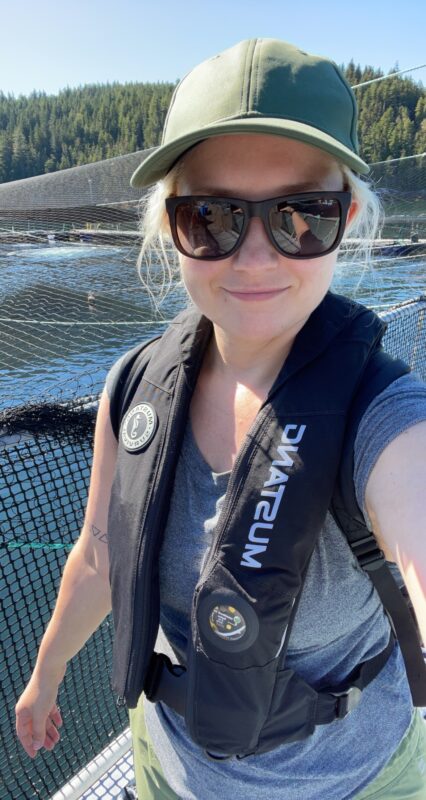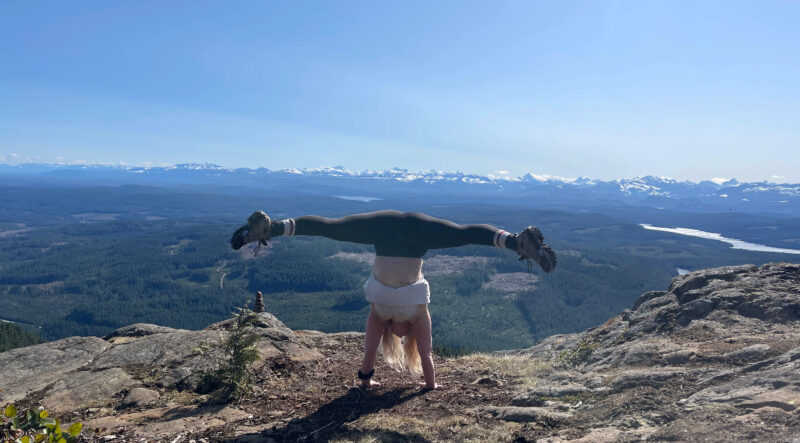THIS IS SALMON FARMING with SAM TOMKINSON
“I think our young professional’s group is starting to become a great success story.“
Aquaculture is responsible for thousands of high-paid, skilled, and rewarding jobs across British Columbia. As the demand for sustainable and affordable farmed salmon grows worldwide, there is a fit for virtually any career path in this industry. In the eighth and final of our Q&A series with young professionals in BC’s salmon farming sector, we speak with Sam Tomkinson, Regulatory Specialist, Grieg Seafood BC Ltd.
Tell us a little bit about yourself?
I grew up in Muskoka Ontario, and I completed a double degree in Biology and Physical Geography, then a post graduate certificate in Aquaculture. It was after experiencing the world of aquaculture, I knew immediately that I wanted to get out west.
I currently live in Gold River. We chose this town to live in because it offered us a close trip to the outdoors when we want to camp or hike. I, also, have a bunch of chickens, two cats and a dog. I have lived in BC for over 5 years now.
What are two opportunities you encounter as a young salmon farmer in British Columbia?
Since our industry is 2/3 workers under 35, I feel like we do have a say in things, and what we do matters not just to our companies but our whole industry in BC. I feel like this gives me an opportunity to make a change in this industry and hopefully one day be able to shape those under me.
Another unique opportunity is, I get to live in the most beautiful place in Canada, in my opinion. I am from Ontario where a “hill” is considered a ski mountain. Right now, my drive to work is full of mountains and beautiful lakes. I consider myself so lucky to be able to work on the ocean and experience the beauty that BC has to offer.
What are two challenges you come across as a young salmon farmer in British Columbia?
One of the major ones, is when posting on social media or talking about my job in general, there are a lot of people that want to tear you down. At times this can be very difficult. I believe in this industry and my job, or I wouldn’t be working here. It can be an awful feeling when hateful people can make you rethink all the good things you are doing. Often I will try to explain to people what we do, and there are the rare occurrences that a few people realize they were wrong, but when it comes to social media, people are willing to sit at their keyboard for days arguing about a topic they have barely scratched the surface of.
The second challenge would be my age and gender. I am a 27 caucasian female. I have always enjoyed jobs that had labour aspects to them…starting on an ocean farm was my favourite because I got to drive a boat and work on the ocean. The diversity of the farms is getting better. I love going out to a farm and seeing other female workers. The advancements in technology have made this industry more diverse in more than the gender aspect.
So, when or if people disagree with my industry, one of the first comments they will make would be that “You are a female, you don’t know anything” or that I am “too young” to know what I am talking about. I take these comments as pros, instead of cons. I do know what I am talking about, and I do have 5 years of schooling behind me, plus lived experience. So yeah, I actually do know what I am talking about.
In your experience, what are some misconceptions or misunderstandings people may have about salmon farming, and how do you educate the public about it?
Most of the comments I have received about the industry are related to benthic or wild salmon. Most people believe that what lies under the farms are desolate seascapes, this simply isn’t true. If the environment was as bad as people would like to believe, we wouldn’t be able to grow fish in those conditions. We are also heavily regulated, so that the benthic environment has to meet specific parameters in order for DFO to let us restock with fish.
Could you share two insights into the sustainable practices and environmental considerations that are important in salmon farming?
Lowering the carbon footprint has become a major topic of discussion. Farmed salmon is listed as the lowest carbon footprint of all animal proteins by the Global Salmon Initiative Sustainability Report. I think our industry is leading by leaps and bounds and with all this new technology coming in we are going to reduce this even more. The low footprint is extremely important as we move forward, not just for our industry but for everyone. We know we need to make changes and we are making changes every day. Alternative energy sources are allowing us to save energy in so many ways too. I can’t wait to see where we are in the next 5 years.
Another sustainable practice is area-based management (ABM), which covers a variety of practices in one. This practice is good for sea lice management, and the control of any potential outbreak, and greenhouse gas emissions reduction. Having farms located in the same area operating at the same time makes sense for many reasons. For example, if you have multiple farms needing to be harvested at the same time, or net changes, or a treatment for sea lice, all can be easily achieved. Not having to move a boat to the other side of Vancouver Island for these activities lowers any emissions and makes management of these areas a breeze. If sea lice are on the rise, you can utilize multiple vessels to lower the count on all the farms, all at the same time. The ABM strategy is addressed by DFO and has many project areas to test for viability as well. Many companies have operated this way for years, but with DFO jumping onto the ABM train, it drives this sustainable practice home.
How do/would you balance the economic aspects of salmon farming with the need for environmental stewardship and conservation?
I think our industry has made great progress in the past decade. I have been in salmon farming for 5 years now and the amount of technology available is outstanding. I think our industry is the best at leading with environmental aspects in mind, and producing a product that is environmentally friendly. The innovation of this industry is allowing us to be a major contributor to BC’s economy while being environmentally conscious.
What kind of technological advancements or innovations have you seen in salmon farming since you have been in the industry, and how have they influenced your work?
I started off as a farmer in Port Hardy BC. This gave me an opportunity to see the farm from the ground up, which has helped me greatly in my current roll. In the past 5 years I have seen advances in sea lice treatment, mortality collection, and predator deterrents, to name a few. I think the advancement to vessels and treatment has been the highlight. When you see these large vessels that don’t just move fish out to farms anymore, they are actually able to treat fish to reduce the sea lice load. And the amazing things is, they capture all the sea lice so they are not going back into the environment.
Can you share any other notable success stories or achievements in your salmon farming career thus far?
I think our young professional’s group is starting to become a great success story. We had great reviews from our first panel we completed this year at the AAC. We are becoming more involved in our communities and we are making ourselves known on many platforms. I can’t wait to see what this awesome group of people are going to achieve.
Last two questions, what do you like to do in your spare time?
In my spare time I enjoy teaching dance and staying active. Dance gives me the ability to express myself creatively and keeps me involved in a sport I have been a part of for as long as I have been able to walk. Being on the water or in the forest is my happy place because I grew up camping and fishing and I get to continue that passion as much as possible.
Do you have a favourite restaurant you go to for salmon sushi, or any other favourite dish?
My favourite sushi would be from Sushi Mong as they source farmed fish. It’s amazing to see sustainable protein in local restaurants. Really any farmed salmon dish on any menu would be a go-to for me.


